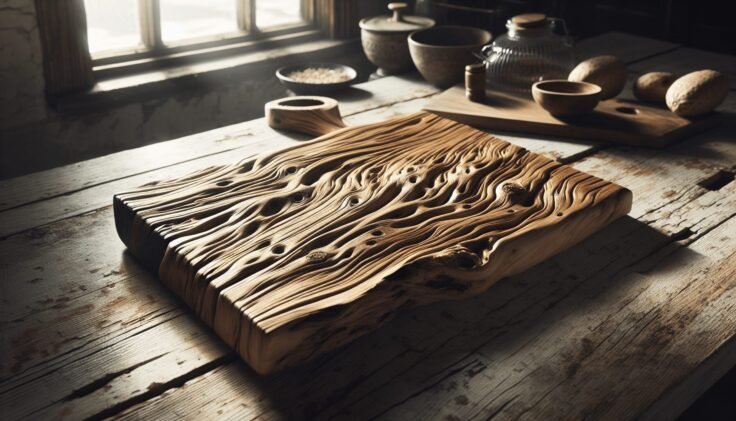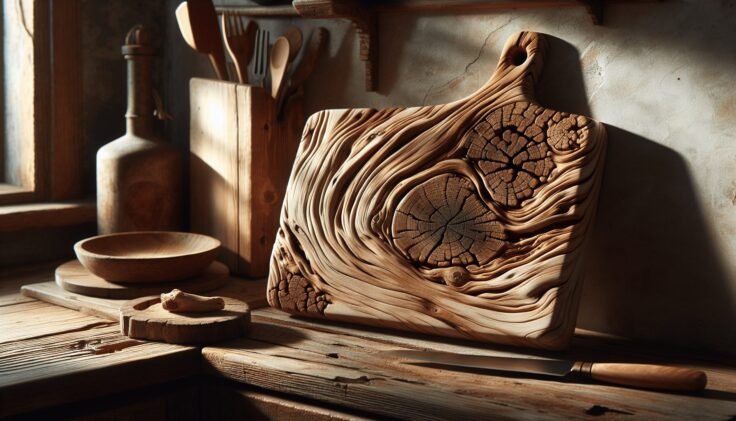Have you ever wondered if your kitchen could be both eco-friendly and stylish? Enter the driftwood cutting board, an exceptional addition to any kitchen that combines functionality with a rustic but elegant aesthetic. In today’s culinary landscape, more individuals are opting for sustainable and environmentally conscious choices when it comes to their kitchenware, and a driftwood cutting board fits this trend perfectly.
What is a Driftwood Cutting Board?
Definition and Origin
A driftwood cutting board is crafted from pieces of driftwood, which are wood logs or timber carried by currents to the shorelines. Naturally weathered by the sun, sea, and sand, driftwood offers a unique texture and appearance that is both charming and resilient. Collectors often harvest driftwood from coastal areas, giving each piece its unique story and character.
Unique Characteristics
Each driftwood cutting board is one-of-a-kind, owing to its natural grain patterns, weathering effects, and color variations. The natural process of tumbling through the sea smooths out sharp edges and gives each board its distinctive look. Not only are these cutting boards fascinating to look at, but they also bring a piece of nature directly to your home.
Benefits of Using a Driftwood Cutting Board
Aside from their aesthetic appeal, driftwood cutting boards offer a variety of benefits to those who use them regularly. These benefits range from environmental advantages to practical kitchen applications.
Eco-Friendly Choice
Choosing a driftwood cutting board helps reduce the demand for freshly cut timber. By repurposing wood that has naturally fallen and washed up on shores, you contribute to sustainability efforts and help minimize deforestation.
Durable and Long-Lasting
Driftwood is known for its enduring durability. The natural seasoning that occurs through its exposure to the elements makes it particularly resilient, often lasting longer than boards made from freshly-cut wood.
Naturally Antimicrobial
Driftwood naturally possesses antimicrobial properties because of the tannins present in the wood, which help to inhibit bacterial growth. This means you can prepare food with peace of mind, knowing your board is working to keep your cooking surfaces clean.
Aesthetically Pleasing
The different tones and elements of driftwood cutting boards can complement a broad range of kitchen decor styles, from rustic to modern. Their unique textures and patterns add an organic touch to any setting, making them as much a decorative piece as they are functional.

How to Choose the Right Driftwood Cutting Board
Selecting the perfect driftwood cutting board for your kitchen involves considering several factors. Here, we’ll break down how to choose a board that’s right for you.
Consider the Size
Choose a size that suits your kitchen space and the types of tasks you frequently perform. A smaller board is great for quick-cutting jobs and conserving kitchen space, while a larger board is more suitable for elaborate cooking projects.
Check the Thickness
Thicker boards tend to be more durable and robust, capable of withstanding intensive kitchen tasks without warping or splintering. However, they can be heavier, so think about how you’ll need to move and store them.
Inspect the Grain
Consider whether you prefer the fine grain of a sleek appearance or the more pronounced open grain that showcases the wood’s natural beauty. Keep in mind that a tighter grain pattern is often smoother, which might be preferable for some kitchen tasks.
Verify the Source
Ensure that your driftwood board comes from a reputable source to guarantee it is collected sustainably. It’s worth asking manufacturers or sellers about their sourcing practices to ensure ethical considerations are met.
Caring for Your Driftwood Cutting Board
Proper maintenance of your driftwood cutting board will ensure it remains a functional and beautiful kitchen tool for years to come.
Cleaning
Clean your driftwood cutting board using warm soapy water after each use. Avoid soaking it in water, as this can lead to warping or cracking. Rinse and dry thoroughly to maintain its condition.
Oiling
Applying a food-safe oil, such as mineral oil, monthly or as needed can help to preserve the wood’s moisture and prevent it from drying out. Oiling also enhances the board’s natural color and pattern, showcasing its unique beauty.
Avoid Harsh Chemicals
Do not use bleach or harsh cleaning agents on your driftwood cutting board, as these can damage the wood’s surface and taint food. Instead, use a mixture of vinegar and water for additional sanitization, if needed.
Regular Inspection
Check regularly for any signs of wear such as cracks, deep cuts, or splintering. Address these as they occur to prevent bacteria from nesting in the grooves. Sanding lightly and re-oiling can fix many minor imperfections.

Environmental Impact and Driftwood Cutting Boards
The environmental implications of using driftwood resources are a significant factor. Being informed about these allows consumers to make better choices.
Sustainable Practices
Sourcing driftwood responsibly ensures minimal disruption to coastal ecosystems. These practices include collecting only dried and washed-up wood and ensuring that the wood isn’t home to live marine organisms.
Carbon Footprint
Using driftwood eliminates the need for logging, which reduces carbon emissions associated with wood processing and transport. This means that choosing a driftwood cutting board can lower your overall carbon footprint, contributing to a more sustainable environment.
Promoting Awareness
Driftwood products bring attention to the importance of recycling and the beauty that can be found in repurposing materials. Supporting these items sends a message about your commitment to environmental responsibility.
Driftwood Cutting Board vs. Other Cutting Boards
When setting out to choose a cutting board, it can be useful to understand how driftwood compares to other popular materials.
| Feature | Driftwood | Bamboo | Plastic | End Grain Wood |
|---|---|---|---|---|
| Durability | High | Medium | Low-Medium | High |
| Eco-Friendliness | Very High | High | Low | Medium |
| Maintenance Required | Medium | Low | Low | High |
| Aesthetic Value | Very High | Medium | Low | Very High |
| Cost | Moderate-High | Low | Low | High |
This table highlights how various materials stack up against driftwood in terms of key factors. The driftwood cutting board excels in durability, aesthetic value, and eco-friendliness, making it a compelling choice for those prioritizing sustainability and style.
Common Concerns and Misconceptions
It’s natural to have doubts or misconceptions about new kitchen items, so let’s address some of the frequent concerns surrounding driftwood cutting boards.
Is Driftwood Safe for Food Prep?
Yes, driftwood is safe for food preparation. When treated and finished correctly, the wood itself provides a hygienic surface. Look for boards treated with food-safe finishes for peace of mind.
Will Driftwood Warp Over Time?
Due to the natural seasoning and treatment, driftwood cutting boards are less prone to warping compared to other types of wood. Proper care, such as oiling and avoiding prolonged water exposure, can prevent warping entirely.
Are They Just a Passing Trend?
While they may seem trendy due to the current interest in eco-conscious products, driftwood cutting boards have enduring appeal because of their unique beauty, durability, and sustainable nature. They’re more than just a fad—they’re part of an ongoing shift toward environmentally-friendly living.
Conclusion
As you’ve discovered, a driftwood cutting board is more than a simple kitchen tool. It embodies a philosophy of sustainability and an appreciation for the natural world, offering both beauty and practicality. Choosing a driftwood cutting board means investing in an eco-friendly lifestyle without compromising on style or function. Whether you’re an avid home cook or someone keen on making environmentally-conscious choices, this cutting board is bound to enhance your culinary experience while advocating for a more sustainable future.